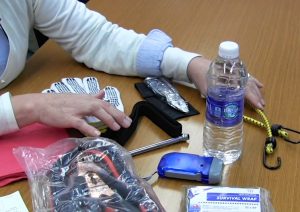
This summer, stay safe on the road by inspecting your vehicle ahead of an extended trip. Photo: Brian de Karma
Along with seasonal activities like swimming, barbecuing and beach-going, summer presents an ideal occasion for a perennial favorite pastime: the great American road trip. However, while you may be ready for rockin’ down the highway, if your vehicle isn’t roadworthy, your asphalt adventure could end up being short-lived. To ensure your vehicle is primed, read the following inspection and maintenance checklist.
Fluids
Check the levels and condition of your vehicle’s engine oil; coolant; and transmission, power steering, and brake fluids. These fluids are the lifeblood of your vehicle, so they should be replenished to the “full” line before you embark on your road trip. Also, check the condition of the fluids—if they appear dirty, have a thick consistency or smell burnt, you should have them changed.
Tires
One of the most common setbacks on a road trip is the dreaded flat tire. While this can’t always be avoided, you can reduce the chances by inspecting your tires prior to your trip. First, make sure they have an adequate amount of tread. Most modern tires have built-in tread wear bar indicators that let you know when it’s time to change them; otherwise, you can use the good old-fashioned “penny test.” Next, use a handheld gauge to check the tires’ air pressure (PSI). When inflating your tires, remember to reference the PSI level listed on your driver’s side door jamb (or owner’s manual), not what’s printed on the tires themselves.
Electrical system
Test your vehicle’s headlights and brake lights, windshield wipers, and other electrical components. It’s also a good idea to have the battery tested to make sure it still has plenty of life left. If you’re driving an RV, an electrical system test is especially important due to the additional equipment on board. Besides testing your generator for proper operation, verify the functionality of electrical appliances like your microwave and refrigerator. (Also, RV drivers, don’t forget to test your vehicle’s plumbing and gas systems.)
Air conditioning
In the heat of summer, a malfunctioning air conditioner can be quite the buzzkill for any road trip. If your vehicle’s air conditioner hasn’t been serviced in a long time, have your mechanic check the refrigerant level and recharge it if necessary.
Emergency kit

A vehicle emergency kit is always good to have, but it’s especially important when taking a long road trip. Photo: American Ratings Corporation ©2021
Even if your vehicle is 100% road-ready, things can still unexpectedly go wrong, so it’s important to be prepared for “what ifs.” In the event of a vehicle breakdown, a fully stocked emergency kit can help you stay safe and even perform temporary repairs. Besides trunk essentials like jumper cables and a spare tire kit, here are some items your emergency kit should include:
- Bungee cords and tether straps for fastening needs
- Electrical tape to make quick, short-term repairs
- A mechanically powered flashlight (no batteries required)
- A pair of gloves
- Roadside flares or battery-powered marker lights
- Extra engine oil and coolant
- Rags and waterless hand sanitizer
- A blanket
- Spare water and nonperishable food items
Find a Diamond Certified auto mechanic in your area
